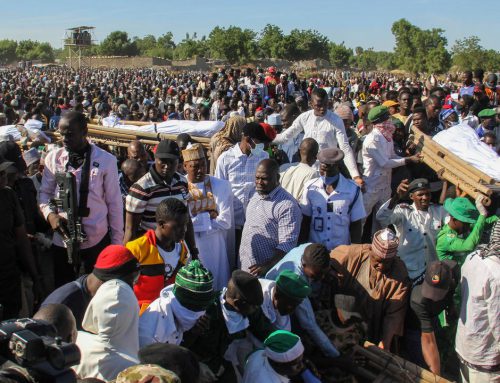The Messenger of Allah, peace be upon him, is narrated to have said: “The Prophethood will remain amongst you for as long as Allah wills it to be. Then Allah will raise it when He wills to raise it. Then there will be the caliphate upon the Prophetic methodology. And it will last for as long as Allah wills it to last. Then Allah will raise it when He wills to raise it. Then there will be biting kingship, and it will remain for as long as Allah wills it to remain. Then Allah will raise it when He wills to raise it. Then there will be tyrannical (forceful) kingship and it will remain for as long as Allah wills it to remain. Then He will raise it when He wills to raise it. Then there will be a caliphate upon the Prophetic methodology”.
This hadith represents the strongest case for those wishing to see the return of the Islamic caliphate after its demise in 1924. It has been the foundation for the emergence of a number of Islamic movements that have made the return of the Islamic caliphate part of its mandate. Perhaps the Muslim Brotherhood and the Hizb ut-Tahrir represent the first model of such movements that ascribed a primary importance to this hadith. In contrast to these two movements, another model inspired by this hadith declared that return of the promised caliphate on June 29, 2014. This model is a maddened attempt to employ religion in politics. This model was formed with the union of the Al-Qaeda factions in Iraq and Sham to form what is today known as the Islamic State of Iraq and the Levant «Daesh». They swore allegiance to Abu Bakr al-Baghdadi as the caliph (successor) to the Muslims.
Daesh’s claim to be a caliphate was clearly inspired by the earlier mentioned hadith. This is evident in the propaganda texts of this organisation who have used this hadith to great lengths to persuade people of its political ambitions and to attract youth and volunteers to migrate to areas they control.
Here, we will not go into details as to the paradoxes between the embodied practices of Daesh with the concept of the rightly guided caliphate which is based on the establishment of justice, security and safety, mutual affection and compassion which Muslims realised in the brilliant caliphates of Abu Bakr, Umar, Uthman and Ali, rather, we will engage in the examination of the cited hadith concerning its validity, for which when found to be invalid, renders all the effects and implications that ensue thereof null and void.
Imam Ahmad reported this hadith in his Musnad: Narrated Suleiman ibn Daoud Tayaalisi narrated Daud ibn Ibrahim Al-Wasti, narrated Habib ibn Salem, narrated Nu’man ibn Bashir, Huzaifa reported, the hadith.
Al-Bazzar also reported the hadith in his Musnad: Narrated Al-Waleed ibn bin Amr ibn Sikeen said: Yaqub ibn Ishaq Hadrami, said: Ibraham ibn Daud, said: Habib ibn Salem reported that Nu’man ibn Bashir, said that Huzaifa ibn al-Yaman, said, the hadith.
It is evident in the report of Al-Bazzar that Yaqub ibn Ishaq confused the “Daud ibn Ibrahim” with “Ibrahim ibn Daud” where the correct name is “Daud ibn Ibrahim” according to the report of Imam Ahmed.
Both Huzaifa ibn Yaman and Nu’man ibn Bashir are companions who are all just as agreed by the scholars of the science of criticism and praise (ilm al-jarh wa al-ta’dil). They are the third in the series of narrators. Habib ibn Salem was the scribe of Nu’man ibn Bashir, as stated in the history of Ibn Mu’in. Al-Bukhari mentioned in his al-Tarikh that he was the scribe of Nu’man ibn Bashir requires some examination. He is considered a trustworthy narrator except that he was prone to leniency (in his reporting). Nevertheless, a group of narrators reported his narrations except for al-Bukhari.
The real problem in this hadith is that the fourth narrator Daud ibn Ibrahim is a figure on which some confusion exists among the scholars of ilm al-jarh wa al-ta’dil. He is mentioned in their books with different names, namely:
Daud ibn Ibrahim al-San’aani (husband of the sister of Abdul Razak, the author of the al-Musannaf. He narrated from Tawoos and Wahab. He is trustworthy but has no association with this hadith)
Daud ibn Ibrahim al-Baahili. (He narrated from al-Zuhri. He is anonymous [majhool] according to al-Dhahabi in his Mizan al-I’itidal [The Balance of Moderation], and has no association with this hadith)
Daud ibn Ibrahim Qadi Qazwayn (He narrated from Shu’bah. His hadith is not accepted [matrook] as he was known to lie and listed in the Al-Duafa’ wa al-Matrukin [The Weak and Rejected] by Ibn al-Jawzi)
Daud ibn Ibrahim al-‘Aqili al-Wasiti (He narrated from Khalid ibn Abdullah. He is anonymous and a liar as reported by al-Azadi in his Kitab al-Duafa’ [Book of the Weak])
Daud ibn Ibrahim al-Wasiti (He narrated from Habib ibn Salem. He was considered trustworthy by al-Tayalasi and is among those who narrate this hadith)
After studying and scrutinising the genealogy and teachers of the five narrators, it becomes evident that significant confusion took place among the scholars of ilm al-jarh wa al-ta’dil concerning the names of the last three narrators. They are different names for the same person and the scholars mistakenly considered them three different people.
Daud ibn Ibrahim Qadi Qazwayn is the same Daud ibn Ibrahim al-‘Aqili. In one of the isnads of Ibn Asakir in his Tarikh al-Damshq (The History of Damascus) that Muhammad ibn Ayyub ibn Yahya ibn al-Darees al-Razi said: Daud ibn Ibrahim al-‘Aqili Qadi Qazwayn, said: Khalid ibn Abdullah al-Wasiti, as mentioned in an anecdote in Tarikh al-Madinah al-Sharifah of al-Sakhawi (The History of the Noble City) that the imam of the Jami’ of Qazwayn Ja’far ibn Muhammad ibn Hamad, said: narrated Daud ibn Ibrahim al-‘Aqili Qadi Qazwayn.
Also, Daud ibn Ibrahim al-‘Aqili Qadi Qazwayn is the same al-Wasiti. Ibn al-Jawzi Al-Duafa’ wa al-Matrukin: Daud ibn Ibrahim al-‘Aqili al-Wasiti narrates from Khalid ibn Abdullah. Al-Azadi says of him, an anonymous (majhool) liar as mentioned by Ibn Abi Khaythamah in his al-Tarikh al-Kabir (Great History) and indicated that Qadi Qazwayn is from Wasit.
The Daud ibn Ibrahim al-Wasiti who we earlier mentioned was considered trustworthy by al-Tayaalisi is the same Daud ibn Ibrahim Qadi Qazwayn. Al-Razi considered him matrook as he used to fabricate. Daud ibn Ibrahim al-Wasiti considered trustworthy by al-Tayaalisi, and Daud ibn Ibrahim al-‘Aqili are matrook and a liar. This Daud ibn Ibrahim al-‘Aqili al-Wasiti, as regarded by al-Hafiz al-Mizzi and al-Rafi’i al-Qazwayni, is the same Qadi Qazwayn, the same al-‘Aqili, and the same al-Wasiti accused of lying and fabricating hadith. The objection is that al-Tayaalisi’s endorsement is not enough to regard the hadith as authentic. Furthermore, al-Tayaalisi is among the scholars of narration, not of ilm al-jarh wa al-ta’dil, and as such his endorsement of trustworthiness is not valid. Moreover, the rules of the science state that criticism is prioritised over praise, especially when the criticism is that of lying and fabrication which is the case in this hadith. There is also indication that Daud ibn Ibrahim was mentioned by Ibn Hibban in the Kitab al-Thiqaat (Book of the Trustworthy), which some have used to defend the authenticity of the hadith. The response to this is simple. Ibn Hibban ia known among the scholars of hadith as being among the lax. In his Kitab al-Thiqaat, he confused Daud ibn Ibrahim al-San’aani who is trustworthy, with Daud ibn Ibrahim al-Wasiti Qadi Qazway whose hadith is matrook.
Thus, the weakness of the hadith is evident. In addition to being an ahaad hadith, the weakness of Daud ibn Ibrahim renders it a hadith not suitable as any form of evidence, especially for matters pertaining to the destiny of the entire Ummah. The hadith is fabricated and is not authentic. This reveals the falsity of all the effects that ensue from it concerning intellectual and political aspirations of a return of the caliphate inspired by this fabricated hadith.
It should be noted here that there is another hadith that shares a similar meaning which narrates the Prophet (PBUH) to have said: “The Prophetic caliphate will last for thirty years. Then Allah will give the dominion to whomever He wills”. This hadith has been reported from numerous narrations, most of which contain significant weakness. However, this is not the place to discuss this hadith. This hadith did not mention the return of the caliphate based on the Prophetic method after the first caliphate, as opposed to the hadith which we have discussed. We then pose the question to those who refer to the discussed hadith to justify the pseudo-caliphate of Daesh and those wishing for a return of the caliphate: Is it permitted to base a political project affecting the destiny of the Ummah and the religion on a such fabricated hadith!!!
*Dr.Tarik Ladjal is Professor of History at Effat University in Jeddah, Saudi Arabia





